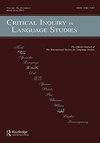Dialogue and neoliberalism: alternative conceptions for the second language classroom
引用次数: 1
Abstract
Abstract The paper first reviews how conventionalized uses of dialogue in the language classroom have facilitated a neoliberalist agenda, mainly by positioning learners in a reproductive, consumer role, and teachers as deskilled operatives of scripted interactions. It then discusses three other conceptualizations of the role of dialogue which may offer an alternative. The first derives from assumptions about how language is best acquired, by emphasizing exposure to, and engagement in, natural language use. The limitations of this in relation to the role that conscious attention to language may offer and in relation to how it similarly positions learners as consumers and teachers as managers, are then discussed. A second conceptualization of the use of dialogue derives from education theory and emphasizes dialogic approaches involving exploratory talk as a means of helping learners construct their own understandings of language knowledge and the learning process. The paper argues, however, that neither of these conceptualizations of the use of dialogue offer effective alternatives to the pressure to replicate neoliberalism. The paper then sets out some key requirements for an alternative and argues that a third view, emphasizing participatory dialogue, may provide this. A model is outlined, emphasizing negotiated classroom work, with examples for implementation.对话与新自由主义:第二语言课堂的替代概念
摘要本文首先回顾了语言课堂中对对话的传统化使用是如何促进新自由主义议程的,主要是通过将学习者定位为生殖、消费者的角色,而教师则是脚本互动的桌面操作员。然后,它讨论了对话作用的其他三个概念,这些概念可能提供一种替代方案。第一个来源于关于如何最好地获得语言的假设,强调接触和参与自然语言的使用。然后讨论了这一点在有意识地关注语言可能发挥的作用方面的局限性,以及它如何将学习者定位为消费者,将教师定位为管理者。对话使用的第二个概念来源于教育理论,强调对话方法,包括探索性谈话,以此帮助学习者构建自己对语言知识和学习过程的理解。然而,该论文认为,这两种使用对话的概念都没有为复制新自由主义的压力提供有效的替代方案。然后,该文件提出了替代方案的一些关键要求,并认为第三种观点,即强调参与性对话,可能会提供这一点。概述了一个模式,强调协商课堂作业,并举例说明实施情况。
本文章由计算机程序翻译,如有差异,请以英文原文为准。
求助全文
约1分钟内获得全文
求助全文
来源期刊

Critical Inquiry in Language Studies
Arts and Humanities-Language and Linguistics
CiteScore
5.30
自引率
0.00%
发文量
23
 求助内容:
求助内容: 应助结果提醒方式:
应助结果提醒方式:


